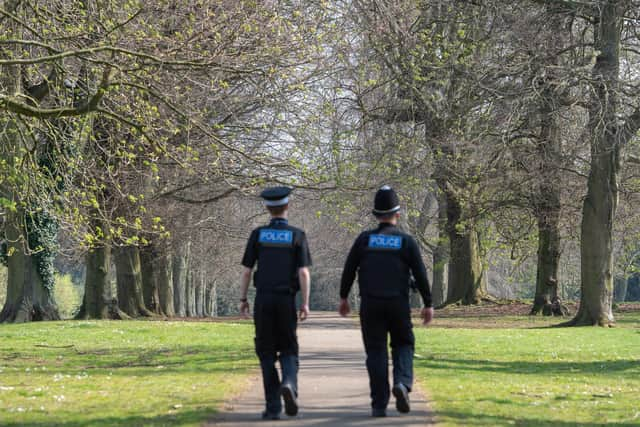Asian and black people more likely to get Covid fines than white people in Bedfordshire
and live on Freeview channel 276
Asian and black people in Bedfordshire were more likely to be given fines for breaking Covid-19 lockdown rules than white people, new figures suggest.
Human rights organisation Liberty said the figures – which show significant disparity across England and Wales – are evidence of the Government prioritising criminalisation over public health, and of bias within police forces.
Advertisement
Hide AdAdvertisement
Hide AdFigures obtained via a Freedom of Information request to the National Police Chiefs Council (NPCC) show Bedfordshire Police issued 727 fixed penalty notices for breaches of coronavirus regulations between March 2020 and January 2022, where an ethnicity was stated.


Of these, 463 were handed to white people, which – according to the latest population estimates – equates to a rate of 9.7 fines for every 10,000 white people in the area.
Asian people received just 177 fines, but this equates to a rate of 20.8 in every 10,000 people – meaning they were 2.1 times more likely to be fined.
And black people received fines at a rate of 20.2 per 10,000 people, meaning they were also 2.1 times more likely to be fined.
Advertisement
Hide AdAdvertisement
Hide AdChief Superintendent John Murphy, who led Bedfordshire Police’s response to coronavirus, said: “Enforcement of coronavirus regulations was always a last resort for us, with action taken only after attempts to engage, explain and encourage compliance had failed.
“We regularly reviewed the data available to us to ensure that we were acting proportionately. This national data considers the population of Bedfordshire as a whole, however we were able to analyse more specific demand hotspots, often concentrated in urban areas, and in doing so established that the fixed penalty notices being issued were largely proportionate to the demographics of the particular areas in which breaches were being reported by the public.
“Throughout the pandemic we worked closely with national stakeholders, our independent advisory groups and listened to the concerns of our communities.
“We heard from black and Asian community members who were concerned by the picture of more severe health outcomes among diverse groups; it is therefore not surprising that concentrations of reported breaches often occurred in areas where fear of the virus was particularly heightened.
Advertisement
Hide AdAdvertisement
Hide Ad“We take our commitment to being an inclusive police service for all extremely seriously, including the commitment in the national police race action plan to explain or reform any disproportionality in the application of our powers.”
The NPCC was asked to provide the number of fixed penalty notices issued for breaches under coronavirus regulations between March 2020 and June 2022, broken down by ethnicity of the person receiving the fine. No fines were issued from February 2022 onwards.
Liberty said the powers handed down to police during the pandemic were too broad and resulted in "heavy-handed policing" and exposed "symptomatic" biases.
Jodie Beck, policy and campaigns officer at the organisation, said: “By prioritising criminalisation over public health, the Government laid the foundations for overzealous policing that fell hardest, and most unfairly, on people of colour.”
Advertisement
Hide AdAdvertisement
Hide AdThe National Police Chiefs’ Council said early results from independent analysis of fines – due out this autumn – show disparities across race, but these are "not necessarily a sign of discrimination".